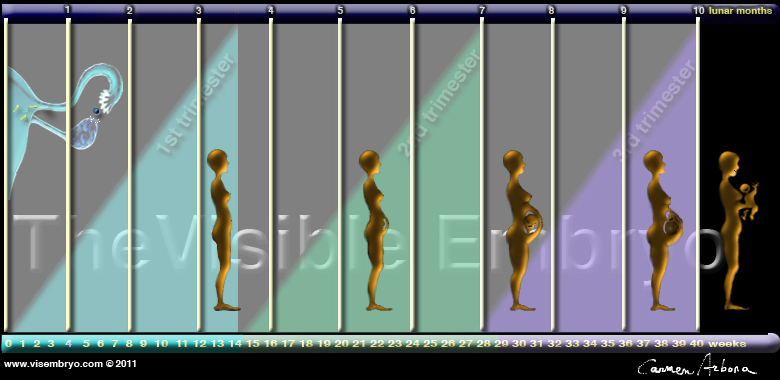|
|
Developmental Biology - COVID-19
Human Embryos Might Be Susceptible to Coronavirus
Genes that play a role in how SARS-CoV-2 virus becomes active in humans are found in embryos at two weeks into pregnancy...
Genes that play a role in how the SARS-CoV-2 virus infects us, have been found in embryos as early as the second week of pregnancy, according to scientists at the University of Cambridge and the California Institute of Technology (Caltech). Researchers believe this could mean embryos are susceptible to COVID-19 if the mother gets sick, potentially affecting her chances for a successful pregnancy.
While initially recognised as causing respiratory disease, the SARS-CoV-2 virus, which causes COVID-19 disease, also affects many other organs. Advanced age and obesity are risk factors for complications but questions concerning the potential effects on fetal health and successful pregnancy for those infected with SARS-CoV-2 remain largely unanswered.
To examine the potential risks, a team of researchers used technology developed by Professor Magdalena Zernicka-Goetz at the University of Cambridge to culture human embryos through the stage when they normally implant in the body of the mother to look at the activity - or 'expression' - of key genes in the embryo. Their findings are published today in the Royal Society's journal Open Biology.
Researchers found patterns of expression of the genes ACE2, which provide the genetic code for the SARS-CoV-2 receptor, and TMPRSS2, which provides the code for a molecule that cleaves both the viral spike protein and the ACE2 receptor, allowing infection to occur. These genes were expressed during key stages of the embryo's development, and in parts of the embryo that go on to develop into tissues that interact with the maternal blood supply for nutrient exchange. Gene expression requires that the DNA code is first copied into an RNA message, which then directs the synthesis of the encoded protein. The study reports the finding of the RNA messengers.
"Our work suggests the human embryo could be susceptible to COVID-19 as early as the second week of pregnancy — if the mother gets sick.
"To know whether this really could happen, it is very important to know whether the ACE2 and TMPRSS2 proteins are made and correctly positioned at cell surfaces. If these steps are taking place, it is possible the virus could be transmitted from the mother and infect the embryo's cells."
Magdalena Zernicka-Goetz PhD, Professor, University of Cambridge, United Kingdom and Caltech University, California, USA.
"Genes encoding proteins making cells susceptible to infection by coronavirus are expressed early in embryo development — when the embryo is attaching to the mother's womb and undergoing major remodelling of all of its tissues and starting to grow.
COVID-19 could affect the ability of the embryo to properly implant into the womb or could have implications for future fetal health."
David Glover PhD, Professor, University of Cambridge, United Kingdom and Caltech University, California, USA.
Further research is required using stem cell models as well as on non-human primates, to better calculate risks. However, the team believes their findings will help emphasise the importanceof of reducing risk of infection in women planning a family.
"We don't want women to be unduly worried by these findings, but they do reinforce the importance of doing everything they can to minimise their risk of infection."
Bailey Weatherbee, PhD student, University of Cambridge, United Kingdom.
Abstract
While initially recognized as causing respiratory disease, the SARS-CoV-2 virus also affects many other organs leading to other complications. It has emerged that advanced age and obesity are risk factors for complications but questions concerning the potential effects on fetal health and successful pregnancy for those infected with SARS-CoV-2 remain largely unanswered. Here, we examine human pre-gastrulation embryos to determine the expression patterns of the genes ACE2, encoding the SARS-CoV-2 receptor, and TMPRSS2, encoding a protease that cleaves both the viral spike protein and the ACE2 receptor to facilitate infection. We show expression and co-expression of these genes in the trophoblast of the blastocyst and syncytiotrophoblast and hypoblast of the implantation stages, which develop into tissues that interact with the maternal blood supply for nutrient exchange. Expression of ACE2 and TMPRSS2 in these tissues raises the possibility for vertical transmission and indicates that further work is required to understand potential risks to implantation, placental health and fetal health that require further study.
Authors
Bailey A. T. Weatherbee, David M. Glover and Magdalena Zernicka-Goetz.
Acknowledgements
D.M.G. and M.Z.-G. are grateful to Caltech for start-up funding. Work in the M.Z.-G. laboratory is also funded by grants from the Wellcome Trust (207415/Z/17/Z); Open Philanthropy; the Weston Havens Foundation; and the Curci Foundation. B.A.T.W. is supported by the Gates Cambridge Trust.
The authors declare they have no competing interests.
Return to top of page.
|
|
Aug 6 2020 Fetal Timeline Maternal Timeline News
 A single human embryo cultured in the lab until it reached implantation stage, then it was stained to reveal (MAGENTA) OCT4 transcription factor; (WHITE) GATA6 transcription factor; (GREEN) F-actin; and its (BLUE) DNA. Analysis of functioning genes in such embryos reveals ACE2, a receptor for SARS-CoV-2 virus, as well as TMPRSS2 protease - which assists viral infection — are present in this very early stage of pregnancy. CREDIT Zernicka-Goetz Lab
|
|



